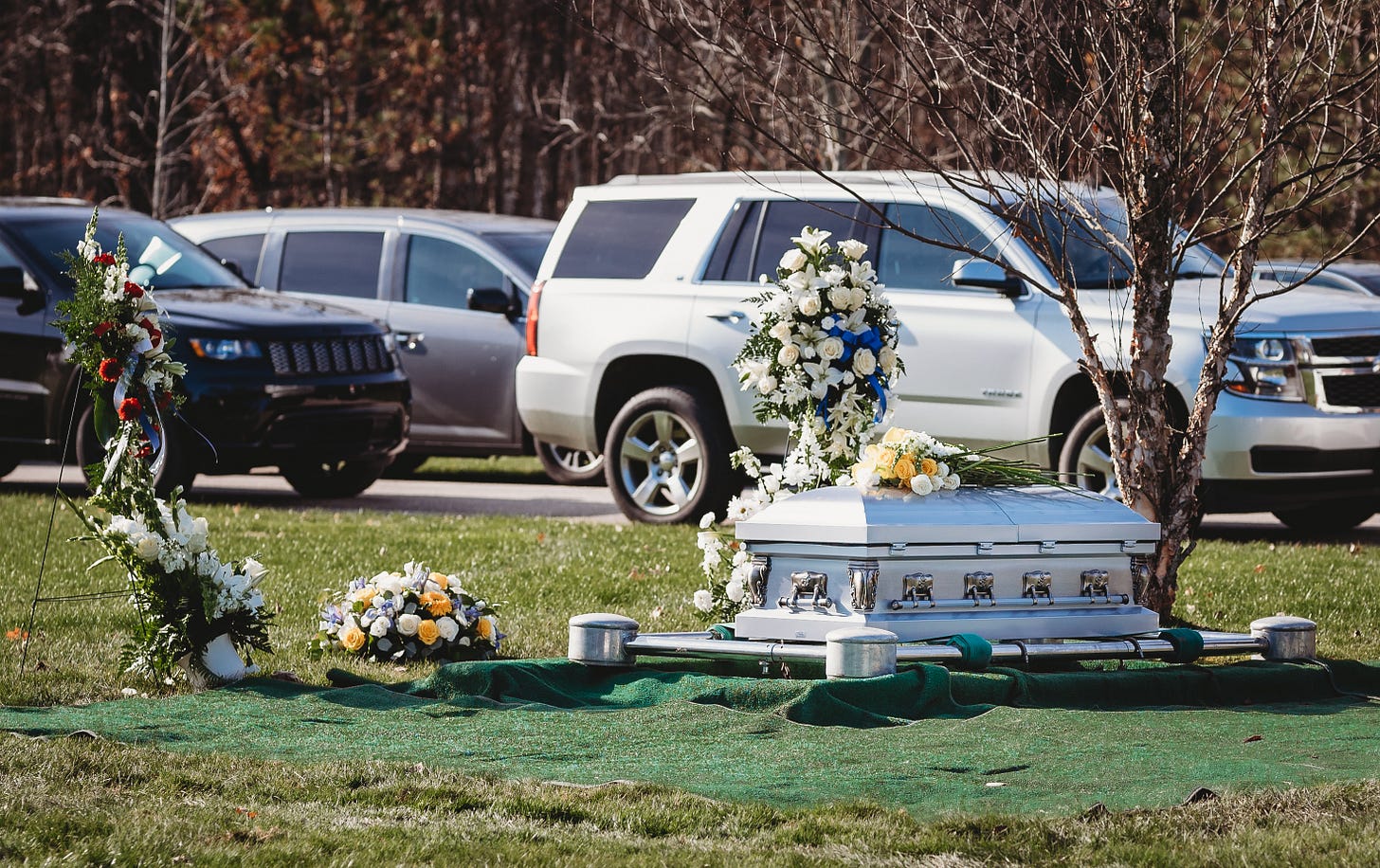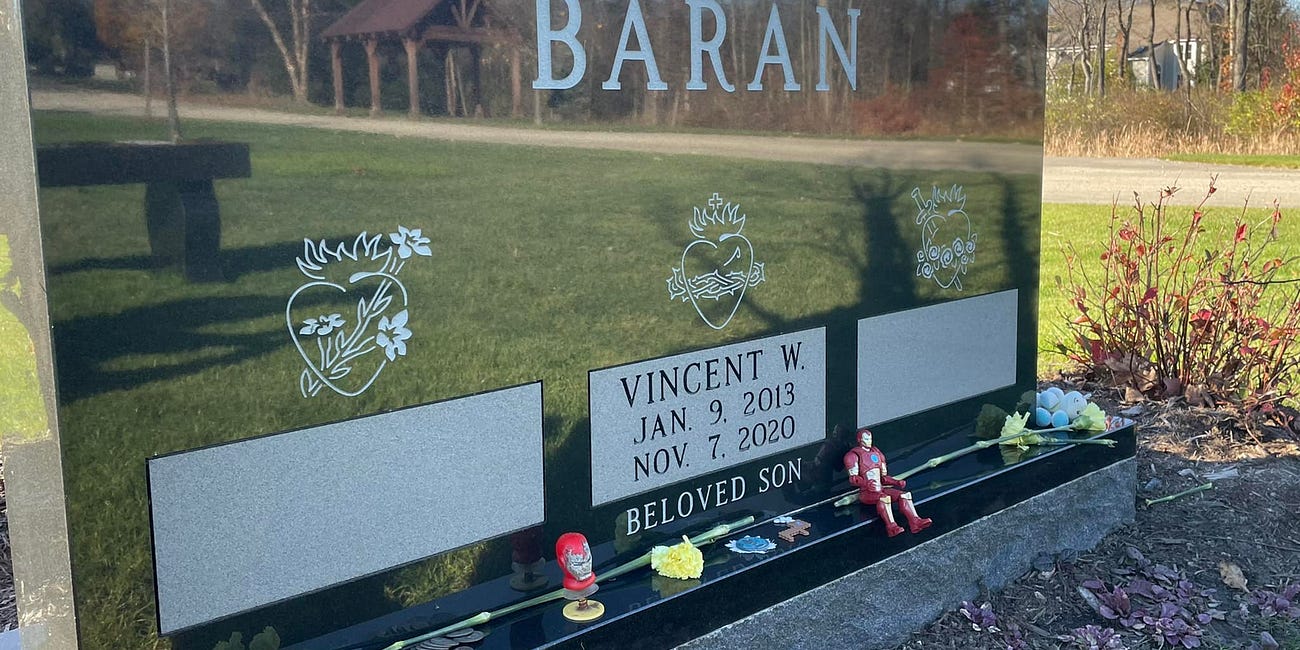What to Say to Those Grieving Sudden, Unexpected, Unnatural Death
I’m not a grief counselor, but I likely have an above-average idea of what works and what doesn’t when it comes to interacting with people who are grieving. I gained a useful, unwanted education in these matters through my experiences after the death of my 7-year-old son in November 2020.
Below I share some of those lessons, with a focus upon interacting with those who are experiencing the sudden, unexpected, unnatural death (e.g., fatal accident, homicide, or suicide) of a loved one. I focus here upon those types of situations for two reasons: (1) these situations are often tougher to deal with than those involving expected, natural death, and (2) it’s what I experienced (my son was hit by a car). That being said, what I share below likely applies to other grief situations as well.
I’m fully aware that numerous other “what to say” types of articles exist. Some of them likely have good ideas. Some of them might not. My thoughts likely echo some of them. I’m sharing my take on it simply because I think it might be valuable—even if it’s redundant. Some people say that American culture doesn’t have as many helpful norms as other cultures regarding interactions with grieving people, and that might be true. All I know for sure is that many people just aren’t very good at knowing what to say or not say to those in grief, so another article on the topic can’t hurt.
What to Say
When encountering people who are navigating tragedy—again, I’m thinking specifically about the sudden, unexpected, unnatural death of a loved one—here are a few items to remember. Specifically, here are a few items to consider saying. Feel free to plagiarize as needed.
Nothing. When in doubt, don’t say anything—but only if you do still actually show up physically. The Jewish ritual of “sitting shiva” seems extraordinarily appropriate for everyone. I’m not Jewish, but as I understand it, the basic idea is that you show up, are near the grieving person, but you just sit there. You don’t talk unless the grieving person initiates conversation. This is a great way to avoid saying anything stupid while showing through your actions that you care.
“I have no words, but I am always here for you.” Don’t try to pretend that you can make them feel better with some magic words. You can’t. But your presence and continued support do make a positive difference.
“You’re experiencing one of the hardest things imaginable.” This is about recognizing the loss and validating what’s going on. It’s honest, and it lets the person know that you see them in their pain.
“I’ve been thinking and praying hard for you.” I found this to be helpful because it lets you know that you’re not the only one bearing a mental burden following your tragedy. Knowing that other people out there really care matters. The “praying” part is particularly important for people of faith.
“I really care about you. I’m also not sure exactly know how to interact with you right now. Would it be OK if I checked in with you every few days?” For close friends and family members, this one is another honest recognition that you can’t take away their pain with your words and don’t know exactly how to help—because you don’t. It then proposes an idea and lets the person react to it. Some of the most supportive people in my circle were (and are) those who continue to check in and recognize my family’s loss, particularly on my son’s birthday and the date of his death.
“I really miss (the deceased person’s name). I can’t even begin to understand what this must be like for you.” Only use the first part of this one if you actually knew the deceased. The second part acknowledges that they’re suffering in an especially acute way that’s beyond your comprehension.
“I’m checking in just to let you know I’m thinking about you. No need to respond.” Simple mentions like this without an expected effort from their end can be a nice way to show support.
“I remember when (the deceased person’s name) did _______ (or how he/she was _______). What a tremendous loss.” Use the person’s name and share a kind anecdote.
“I’ve organized meals to come to your house.” Only say this if it’s true, obviously. Ask about practical matters such as quantity, frequency, and dietary preferences or needs. Getting an edible arrangement or gigantic meal delivered every day is likely too much, so having someone directly quarterbacking all of that could be very helpful.
“I'd like to help you with _______. Would that be OK?” Be specific in your suggestion. Examples might include laundry, childcare, school and activity transportation, yard care, and other items to make life easier. Acute grief can literally make it feel like it’s hard to breathe, so any specific items that can lighten the grieving person’s load would likely be greatly appreciated. Just make sure you’re not creating more work or hassles for the person while you’re trying to help.
What Not to Say
Avoid saying the following to those who are grieving a sudden, unexpected, unnatural death of a loved one; even if some of these may feel or seem appropriate. Note: Since first publishing this, I added a few (one to #1 and one to #4) based upon reader comments (thanks!).
“I understand.” No, you don’t. The same goes for “I know what you’re going through.”
“Everything is going to be OK” or “Time heals all.” How do you know that?
“He/she is in a better place.” Actually, a better place would be him or her still being alive.
“Everything has a purpose” or “This is all part of God’s plan” or “Everything happens for a reason.” Setting aside the matter of whether or not these statements are true, in the moment, they invalidate the person’s pain and fail to recognize the loss. Theological or philosophical debates aren’t particularly helpful to those in the throes of sudden traumatic grief.
“Let me know if I can do anything to help.” This one is a bit tricky, because you likely mean it—you want to help. And sometimes it might be OK, depending upon your relationship with the person and what’s going on in the moment. But the problem with it is that it puts another mental burden back on the person who is grieving. Now he or she has to think about and assign you tasks in order to get help. Instead, consider some specific ways to support them and suggest them as a way to get started.
Anything that insinuates that the death was the fault of the deceased or of the grieving person. Particularly in the immediate aftermath of a tragedy, this likely does more harm psychologically than good. Allow investigations or legal matters to take place in their own proper way. Now, if you have specific expertise that could be useful (e.g., you’re in law enforcement, an attorney, etc.), you could offer that in a helpful, supportive way.
Anything related to grief being five orderly stages. The “five stages of grief” is pseudoscience garbage. Instead, grief is big pile of emotions that come and go in unpredictable ways. It’s like the surface of the ocean—sometimes calm, sometimes full of waves. As I’ve written elsewhere, it’s like a coat that you can never take off.

A grief counselor once told my wife that acute grief lasts about one to three years and chronic grief lasts a lifetime. I think that’s about right. As such, keep in mind that it’s important to continue offering support well beyond the first few weeks or months. My grief counselor told me that after about three months or so, I might actually feel much worse because my initial numbness had worn off. I think that’s about right too.
Resilience is, after all, a team sport. What you say and do for people in their times of need following a tragedy will have a remarkable influence on them. And in those most difficult of moments, we all have the opportunity in simple-yet-powerful ways to lighten the burden, illuminate the darkness, and build hope amid the despair.
References and for further reading
Krychiw, Jacqueline K., Rachael James, and Erin F. Ward-Ciesielski. "Suddenness of death as a determinant of differential grief experiences." Bereavement Care 37, no. 3 (2018): 92-100. https://www.tandfonline.com/doi/abs/10.1080/02682621.2018.1539312
Heavy is the Coat
Heavy is the Coat It’s been two years and some may say It’s time to take it off And hang it up or throw it out Finally get one that’s in style. It’s gotten old it’s torn and rough It’s heavy and it’s light Sometimes it’s warm sometimes it’s cold It awkwardly stumbles in public. When darkness comes and questions fly It makes each breath a chore As sea…
I wrote about resilience before my son died. Here’s what I got wrong.
In retrospect, what I wrote was so naïve. This is my attempt to explain why and offer additional observations. But first, here’s the context. On Nov. 7, 2020, a driver exited a parking lot without looking, and while crossing the sidewalk, hit my 7-year-old son, Vincent. He was riding his bicycle with his three siblings and my wife; they were on their wa…



